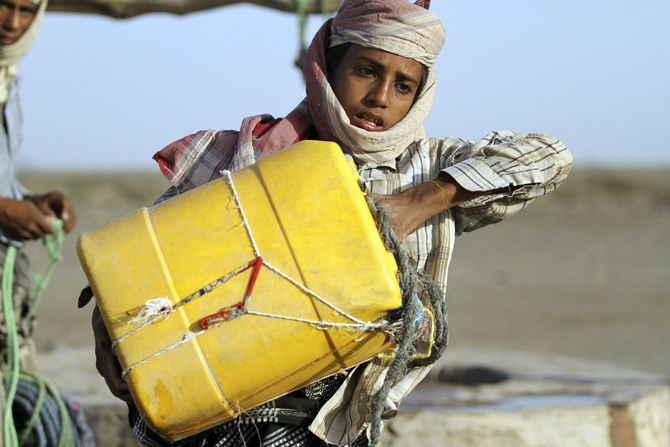
This week, the global community observed World Water Day, which coincided with a midterm review of the UN’s Water Action Decade. The occasion served to raise awareness of, and draw attention to, the water scarcity issues the world is facing, and to promote the security and sustainability of the planet’s freshwater resources.
After all, safeguarding our dwindling water supplies underpins many of the UN’s Sustainable Development Goals, the success of which is under serious threat given concerns about the adequate availability of, and access to, clean water, and the effects of diminished and unsafe water supplies on, for example, health and food security.
Occasions such as this provide opportunities for leaders, governments, businesses, and communities to reflect on what progress has been made on the issue, and to determine whether the planet needs urgent interventions to speed up the progress on efforts to ensure universal access to clean, safe drinking water and proper sanitation. For the Arab world in particular, however, time is quickly running out.
The Middle East and North Africa region contains 11 of the 17 most water-stressed countries on the planet. This affects nine out of 10 children in a region that has the world’s highest fertility rates.
About 60 percent of the region’s water needs are met by imports, a figure that will continue to rise as the population increases. In the next decade, for instance, the average per capita share of Nile waters will decrease by a quarter in a region where agriculture accounts for 80 percent of water use, and nearly half of potable water is unaccounted for or “lost” as a result of leakages, which diminish the overall quality of life.
It has been projected that by 2050, hundreds of millions of people across the Arab world will suffer absolute water scarcity; some in North Africa are already feeling the effects of this which is the most water scarce sub-region, with only 1.4 percent of the world’s renewable freshwater reserves.
Throw in the myriad crises that converge in a perennially fragile part of the world, along with threats to water from climate change and plastic pollution, and intense water scarcity quickly transforms into a geopolitical issue which, if poorly handled, will trigger or prolong conflicts, endanger food security, and spark massive displacements.
In a region marked by conflict, sectarian tensions, uprisings, transnational crime and terror, concerns about droughts and dry riverbeds might seem relatively insignificant. Yet, for many centuries, access to abundant water resources has played a key role in safeguarding human security in the region.
The scarcity of water is primarily a result of the natural aridity resulting from a warm desert climate plus limited surface water and groundwater supplies, which make it very challenging, but not impossible, to meet local water needs.
Unfortunately, climate change is exacerbating the region’s vulnerability, potentially making its water insecurity a threat multiplier that will intensify the dysfunction in a fragile water cycle, and undermine sustainable development and progress in efforts to address issues such as health, hunger, equality, jobs, education, industry, natural disasters, and peace.
Without serious intervention, unprecedented cooperation and concerted efforts to confront this worsening crisis, poverty-stricken, conflict-ravaged countries will be the hardest-hit by unmitigated water scarcity and its devastating effects on the region’s development, economic competitiveness, long-term stability, food and energy security, and habitability.
No one will be spared. Even though countries in the Middle East and North Africa region are not the biggest polluters, the irony is that they stand to suffer the most from runaway climate change.
Some experts predict the next major conflict in this region will be about water; which is not such a far-fetched idea given that civil wars have already been sparked by tensions over scarce resources. Sudan, Eritrea and Syria have experienced outright conflicts or flare-ups in violence either driven by resource scarcity, or intensified by it. Such wars are likely to increase in frequency and scale, creating migratory waves that will add to the pressure on dwindling resources in the places that take in refugees, exporting instability to previously “safe” and habitable zones.
Integrated water development and management must be top global priorities if we are to achieve sustainable water, food, and energy security.
Hafed Al-Ghwell
Worse yet, all of the major water sources in the region cross borders. If we couple this with political landscapes fraught with tensions, and the fact that water is not only a finite resource but also a major commodity, it could easily trigger conflicts between countries.
In Turkiye, the construction and filling of the Ilisu Dam on the Tigris not only exacerbated tensions between the Turkish government and the Kurdish minority in Mardin province, it also raised concerns in downstream Iraq. Southern governorates, in particular, saw their share of Tigris water drop by more than 50 percent, adding the problem of water shortages to a combination of low rainfall and depleted soils that have halted the cultivation of rice, corn, sesame and cotton.
These stresses have dovetailed with other fragilities in Iraq that have sparked waves of protests over a three-year period, signaling the kind of future in store for the Euphrates-Tigris River basin, which is shared by Turkiye, Syria, Iraq and Iran, and portending yet another source of regional strain.
A similar scenario is playing out across the Red Sea. Near century-old tensions between Egypt and Ethiopia remain high over the filling of the Grand Ethiopian Renaissance Dam, which Cairo believes will shrink its share of Nile waters. The two countries have failed to make headway in direct and brokered talks; to Egypt, any disruption to the flow of the Nile constitutes an existential crisis, given the river’s strategic importance to a country in which 96 percent of the total land area is desert.
Fortunately, the issue of water scarcity in the region is not yet a hopeless situation. There are still a number of great opportunities to address the growing scale of water insecurity issues - for example by promoting equitable, resilient transboundary water relations, while countries individually work to reduce their dependence on dwindling precious groundwater supplies.
In addition, policies can be implemented and interventions mounted to ensure uninterrupted access to potable water for all in society, alongside efforts to adapt or mitigate the water-related effects of climate change.
A failure to build on the momentum of the intensifying global climate fight would risk plunging the most water-scarce region in the world into chaos.
For now, the biggest challenge remains restoring the equilibrium between what is available and what the region consumes by protecting the natural replenishment of the water sources that underpin food and energy security, industrialization, competitiveness, regional integration, and improvements to the quality of life.
It can only be hoped that the first UN Water Conference in 50 years, which took place in New York this week, will deliver a much-needed wake-up call that can drive collective action among governments, regional blocs and global development organizations.
Water should also be a top item on the agenda during the UN Climate Change Conference, COP28, in Dubai this year, turning it from a source of apprehension into a vehicle for cooperation that can transcend conflict, reduce regional tensions, overcome shared challenges, and promote common interests.
Integrated water development and management must be top global priorities if we are to achieve sustainable water, food and energy security while ensuring green and inclusive growth for all.
Hafed Al-Ghwell is a senior fellow and executive director of the Ibn Khaldun Strategic Initiative at the Foreign Policy Institute of the Johns Hopkins University School of Advanced International Studies in Washington, DC, and the former adviser to the dean of the board of executive directors of the World Bank Group. Twitter: @HafedAlGhwell












